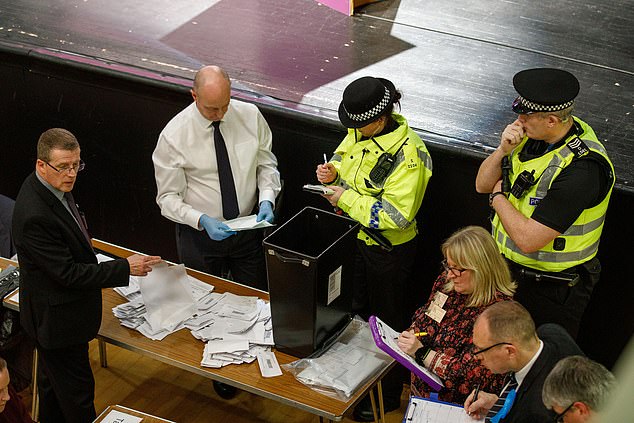
Happy New Year




The British government have announced plans to introduce compulsory voter ID in an effort to tackle fraud. It’s a start but it’s barely scratching the surface.
Voter fraud at polling stations is unbelievably easy to perpetrate and the fact that nothing has been done to tackle it until now is frankly astonishing. You can literally walk into any polling station anywhere in the country with the name and address of a registered voter and vote on their behalf without their knowledge.
Requiring ID to vote in person will deter casual fraud but it won’t stop even a vaguely competent fraudster. Utility bills or other types of ID can be easily forged to give legitimacy to fraudulent entries on the electoral register. ID cards can be purchased online that simply require copies of documents that can easily be forged and the endorsement of someone off the usual list of people who can countersign passport photos – doctors, teachers, councillors, etc. Just the kind of people who will actively campaign for the party that benefits from most vote fraud.
Fraud at polling stations is a problem but it’s certainly not the only problem or even the biggest problem. Postal vote fraud and multiple voting is where most of the fraud occurs.
There are several common types of postal vote fraud. Stealing ballot papers was something that was bragged about in the most recent election, especially in student accommodation at universities where students had already broken up for Christmas. Some people even bragged of paying for blank postal votes at universities.
One of the long-running and very common frauds with postal votes is “community leaders” either collecting blank ballot papers or forcing voters to vote a certain way and taking the completed ballot paper from them. A variation on this is campaigners and candidates visiting care homes to do the same.
Multiple voting is common amongst students where they can quite legitimately register to vote both at their family home and their university. This is to allow them to choose one or the other depending on where they are at the time and which constituency they feel an affinity with. They are only allowed to vote in one constituency or the other but it is common for students to vote by post in their home constituency and in person at their university address.
The only way to prevent postal vote fraud is to limit who is able to request a postal vote in the first place. Postal voting on demand needs to be repealed and become the exception again.
Voters in care homes, sheltered accommodation and student digs who are especially vulnerable to intimidation, coercion and theft of their ballots should not be able to vote by post. Election officials from the local authority should visit such buildings with sealed ballot boxes and officiate over votes being cast to ensure it is being done freely and by the correct person.
Finally, the system of local authorities each maintaining their own electoral register needs to be replaced with a single, national electoral register. This would go some way to preventing voters registering in more than one constituency when they are not entitled to. And, in fact, nobody should be entitled to vote in more than one constituency. Students should be required to pick a home and be restricted to voting at that home.
The above changes – removing the right to postal voting on demand, establishing mini polling stations for groups of at-risk voters, creating a single electoral register covering the whole country and only allowing one entry on the register per person – combined with a requirement to show ID at polling stations should wipe out the majority of voter fraud. Sophisticated fraudsters will always find ways round the system but for most people it will prove to be too much hassle and too big a risk for too little reward.
Whatever is done needs to be done soon and it needs to be comprehensive. Just fiddling with bits of a very broken and corrupt system to be seen to be doing something isn’t good enough. Boris needs to be bold if he is going to tackle voter fraud.
On Thursday I voted Conservative in a general election for the first time, something I always said I would never do.
As a naïve teenager in 1997 I voted Labour and helped Tony Blair achieve his historic landslide victory. Yesterday I helped Boris Johnson achieve a different historic landslide victory of his own.
I joined the Conservatives a year ago on the strength of the local party and despite Theresa May and her treasonous behaviour. The local elections this year saw Labour take a lot of seats off the Conservatives in a campaign that consisted entirely of making promises to save the local A&E from closure that they had no way of keeping. They tried the same again with the general election but voters saw through it this time and rejected their politics of fear.
My own constituency of Telford went from a marginal seat with a precarious 740 vote majority for the Conservative MP, Lucy Allen, to being a Tory safe seat with a healthy majority of 10,941. All over England and Wales, traditional Labour voting constituencies turned blue. Seats that would normally vote Labour if they pinned a red rosette on a donkey returned Conservative MPs and the so-called “red wall” of Labour safe seats across the Midlands and north of England turned out to be more of a red curtain.
With the huge majority the Conservatives have we will now be leaving the EU at last. Boris’ deal is terrible but once we leave there’s no going back and our relationship with the EU can be changed in future.
Not everyone is happy with the result of course. The far left Socialist Worker’s Party had an anti-democracy protest planned in advance. Violent masked thugs took to the streets in London last night, attacking police and demanding the result of the election be ignored.